|
|
|
Sort Order |
|
|
|
Items / Page
|
|
|
|
|
|
|
| Srl | Item |
| 1 |
ID:
189905
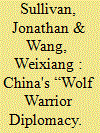

|
|
|
|
|
| Summary/Abstract |
For all the popular interest in “wolf warrior diplomacy,” scant attention has been paid to the internal logics and mechanics of representative communications, notably the intersection with grassroots cyber-nationalism. Centring the connections between official and unofficial actors, we situate Chinese diplomatic communications within the domestic nationalist cyberspace cultures that demand and nourish the “dare to fight” orientation of formal Chinese diplomacy on the international stage. We argue that there is a synergistic interaction between officials and popular nationalism that creates bottom-up incentives to adopt a “wolf warrior” posture, distinct from simultaneous top-down pressures from the central leadership under Xi Jinping to appropriately represent China's “confident rise.” We show through case studies involving MoFA spokesperson and archetypal “wolf warrior” Zhao Lijian, that this interaction extends to sharing unofficial content and ideas in a mutually reinforcing cycle that facilitates a harder edge to diplomatic communications.
|
|
|
|
|
|
|
|
|
|
|
|
|
|
|
|
| 2 |
ID:
189903
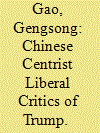

|
|
|
|
|
| Summary/Abstract |
This article challenges the existing scholarship’s characterisation of Chinese liberal intellectuals as Trumpian intellectuals. By conducting a close reading of Chinese academic publications, lectures and opinions aired on social media, this article finds that besides Trump’s Chinese liberal fans, many leading Chinese liberal intellectuals harshly criticised Trump. However, they do not align themselves with American liberals in making all-out partisan criticisms of Trump and American right-wing politics. Instead, their criticisms are mostly centrist. This article argues that Chinese liberal intellectuals’ centrist criticisms of Trump reflect their Confucian, egalitarian and moderate nationalist sympathies, dimensions of their thoughts which have been ignored by existing scholarship regarding them. By exploring Chinese centrist liberal critics of Trump, this article brings to light the ideological heterogeneity within the Chinese liberal camp previously lumped together under the umbrella of “anti-authoritarianism.”
|
|
|
|
|
|
|
|
|
|
|
|
|
|
|
|
| 3 |
ID:
189902
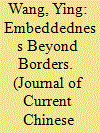

|
|
|
|
|
| Summary/Abstract |
The internationalisation of Chinese non-governmental Organisations (NGOs) is an emerging phenomenon. As new international development actors, how independent are Chinese NGOs from the Chinese state? Based on interviews with eighteen Chinese NGOs and an analysis of secondary sources, the study finds that the internationalisation of Chinese NGOs is variegated rather than solely state-led. The state is not closely involved in much of the internationalisation processes of a majority of Chinese NGOs. However, all Chinese NGOs with overseas operations avoid overstepping a political boundary that is tacitly understood by both NGOs and the state. To explain the duality of both uniformity and diversity among Chinese NGOs, this study develops an embeddedness framework that disaggregates state influences into a primary layer of systemic regulatory guidance that affects all Chinese NGOs, and a secondary layer of influence over NGOs’ operations (initiation, financing, and implementation), within which the varying levels of governmental influence upon different NGOs lie.
|
|
|
|
|
|
|
|
|
|
|
|
|
|
|
|
| 4 |
ID:
189904
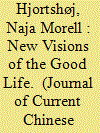

|
|
|
|
|
| Summary/Abstract |
In recent years, efforts to promote entrepreneurship as a possible career path for Chinese university students have intensified alongside the implementation of the official campaign of “mass entrepreneurship and mass innovation” (大众创业, 万众创新, dazhong chuangye, wanzhong chuangxin). Based on semi-structured interviews and long-term ethnographic fieldwork conducted at two Chinese elite universities, this article examines what motivates young Chinese to become entrepreneurs. It is argued that Chinese students imagine entrepreneurship as an alternative to ceaseless striving for high-paying jobs. They believe that becoming entrepreneurs will enable them to pursue their own interests, engage in meaningful projects, experience a life of excitement and variation, and become masters of their own time. This notion of the good life ties in with broader discourses of well-being that are currently proliferating among youth in urban China.
|
|
|
|
|
|
|
|
|
|
|
|
|
|
|
|
| 5 |
ID:
189907
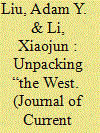

|
|
|
|
|
| Summary/Abstract |
Recent public opinion polls conducted in Europe and the United States show increasingly negative views of China. Does the Chinese public hold similar views of “the West”? Conducting a two-wave survey in China, we found great divergence and asymmetries in Chinese public perceptions. First, Chinese views of European countries and the US diverge sharply, despite these countries being typically grouped together as “the West” in mainstream English and Chinese discourses; the Chinese viewed the US much more negatively than Europe. Second, whereas the Chinese reciprocated American antipathy, there was an asymmetry in public perceptions between China and Europe, with the Chinese expressing much greater favourability towards European countries than the other way around, though the degree of favourability still varied by country. Analyses of respondent attributes also yielded insights that both confirm and challenge some of the conventional wisdom regarding age, education, and party membership in Chinese public opinion.
|
|
|
|
|
|
|
|
|
|
|
|
|
|
|
|
| 6 |
ID:
189906
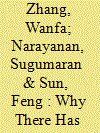

|
|
|
|
|
| Summary/Abstract |
Since the suppression of the student movement in 1989, there has not been any anti-regime or pro-democracy student movement for over three decades in China. What does this suggest? Apart from the known strengthened campus control by the authority which might have forestalled it to some extent, are there alternative reasons? Has the government drawn lessons from the past and since improved its governance, thus effectively enervated student motives to challenge the government? In order to demystify what is behind, the researchers conducted an extensive survey at over thirty-five universities across China from 2015 through 2018. Through analysing the 1,859 valid responses received, the study found that current college students give a high approval rating to the status quo of the country, and they also hold strong optimism for the future. This result may indicate that there is no strong incentive for them, like the generation of the students in the 1980s, to push forward any dramatic political, economic and social changes. The West may need to take this prospect into consideration in their interactions with China, which may enjoy a long period of relative stability without political challenges from college students in the foreseeable future.
|
|
|
|
|
|
|
|
|
|
|
|
|
|
|
|
|
|
|
|
|